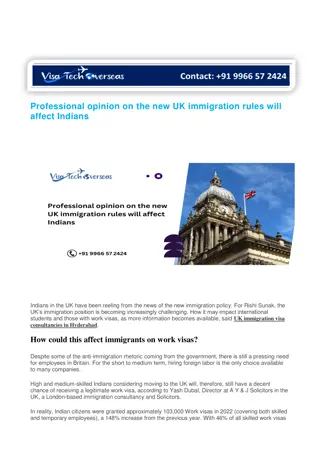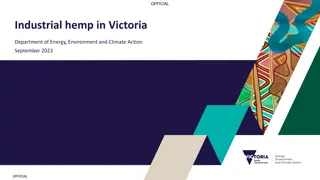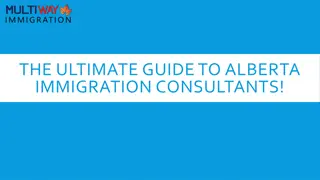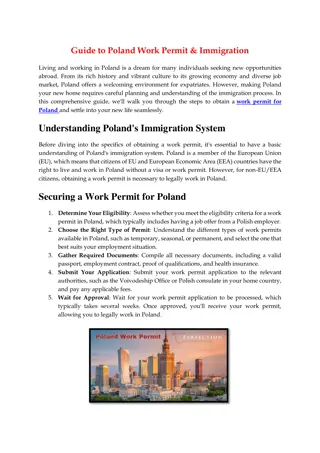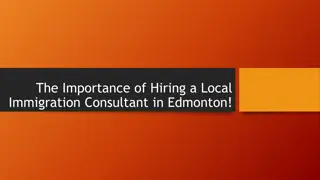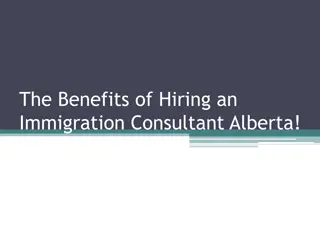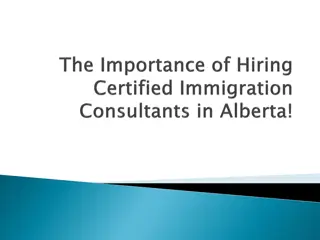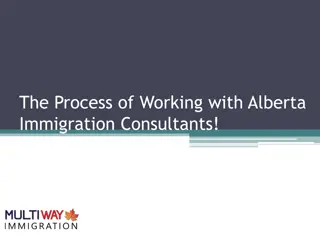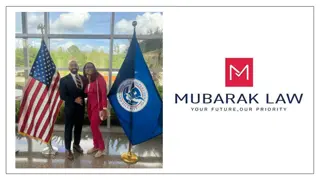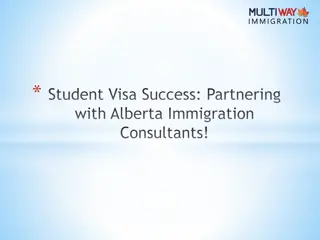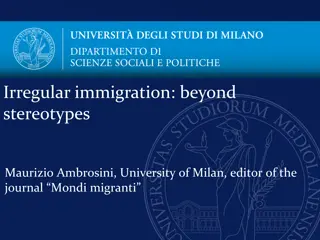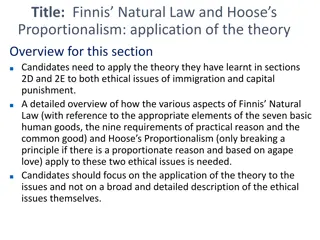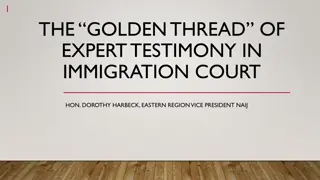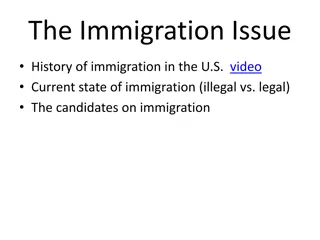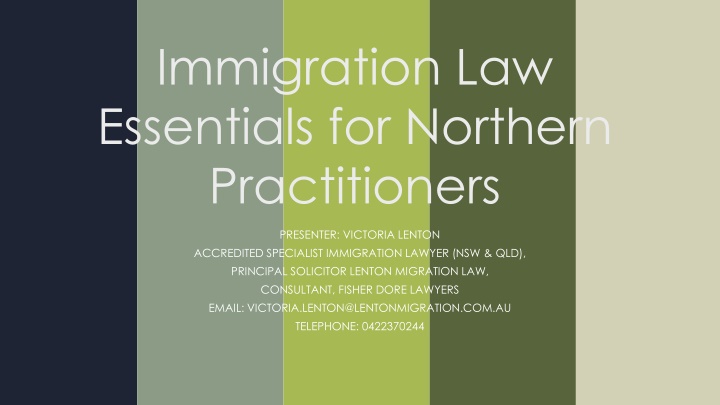
Recent Immigration Law Changes Impacting Visa Holders in Australia
Discover the major recent immigration law changes in Australia affecting visa holders, including extended visa durations, new pathways to residency, and increased income thresholds. Stay updated on the latest developments for immigration law in Australia.
Download Presentation

Please find below an Image/Link to download the presentation.
The content on the website is provided AS IS for your information and personal use only. It may not be sold, licensed, or shared on other websites without obtaining consent from the author. If you encounter any issues during the download, it is possible that the publisher has removed the file from their server.
You are allowed to download the files provided on this website for personal or commercial use, subject to the condition that they are used lawfully. All files are the property of their respective owners.
The content on the website is provided AS IS for your information and personal use only. It may not be sold, licensed, or shared on other websites without obtaining consent from the author.
E N D
Presentation Transcript
Immigration Law Essentials for Northern Practitioners PRESENTER: VICTORIA LENTON ACCREDITED SPECIALIST IMMIGRATION LAWYER (NSW & QLD), PRINCIPAL SOLICITOR LENTON MIGRATION LAW, CONSULTANT, FISHER DORE LAWYERS EMAIL: VICTORIA.LENTON@LENTONMIGRATION.COM.AU TELEPHONE: 0422370244
Major recent immigration law changes Subclass 408 Australian Government endorsed events (COVID-19 Pandemic event) visa o Incredibly flexible and useful visa option for anybody in Australia with a visa that currently permits work, and is currently working or has a job offer. o Provides for 2 year stay now (up from 12 months) o No limitation as to job sector Range of other COVID visa concessions see list here: https://www.homeaffairs.gov.au/covid19/visa-information/visa- concessions
Major recent immigration law changes Significant changes to employer sponsored visas/skilled: o Temporary Skilled Migration Income Threshold is being raised from $53900 to $70000 (1 July 2023) o All subclass 482 visa holders will have a pathway to permanent residency (end of 2023) not just medium and long term stream occupations o 482 visa holders will be eligible for a subclass 186 TRT after 2 years, not 3. o Movement in skilled independent visas lower scores are being invited to apply
Major recent immigration law changes Extending the duration of the subclass 485 Temporary Graduate Visa as of 1 July 2023: o two years to four years for select Bachelor degrees o three years to five years for select Masters degrees o four years to six years for all Doctoral degrees. Introduction of a direct pathway to Australian citizenship for NZ citizens in Australia holding a subclass 444 Special Category Visa (from 1 July 2023). Must have been living in Australia for four or more years.
Major recent immigration law changes Introduction of a permanent residency pathway for Temporary Protection Visa and Safe Haven Enterprise Visa holders all TPV and SHEV visa holders are eligible to apply for the subclass 851 Resolution of Status NZ citizens Introduction of new Direction No 99 guiding section 501 character visa refusal and cancellation decision making makes strength, nature and duration of ties to Australia a primary consideration. Visa application charges will rise (6 40%) as of 1 July 2023 Administrative Appeals Tribunal has been abolished and will be replaced by a new federal administrative review body.
Criminal Law - Immigration issues Two relevant cancellation powers: o Power to refuse or cancel a visa under section 501 of the Migration Act 1958, where the visa holder or applicant fails the character test (eg where they have a sentence of imprisonment of 12 months or more, among other things). o power to cancel a visa under section 116(1)(e) of the Migration Act - Risk to health, safety and good order of Australian community. This can apply to a temporary visa where there is a criminal charge only (no conviction yet).
Serious consequences of visa cancellation o Removal from Australia, or if this will breach Australia s international obligations, indefinite detention in Australia. o Prevented from applying for any other visa while remaining in Australia (with very limited exceptions, namely subclass 866 Protection Visa) o Consequential refusal of all other pending visa applications, and cancellation of any other visa held. o Exclusion periods: o 3 years for section 116 cancellation o Permanent exclusion if cancelled under section 501
Key things to know for criminal lawyers: The potential that a person may be subject to visa cancellation (and the associated consequences) should be considered at the earliest possible stage of a criminal matter. This means that you need to identify whether or not a person is a visa holder at intake stage. Refer the client to a quality immigration lawyer who specialises in visa cancellation matters at the earliest possible opportunity (suggest this occur before conviction if possible) for advice. The risk of visa cancellation should be considered in deciding how or whether to defend a criminal case, and in relation to what form of sentencing you should pursue for the client.
Key things to know for criminal lawyers: Key risk point: Any form of sentence of imprisonment (particularly a single sentence of 12 months, or multiple sentences that add up to 12 months). This applies even if the entire sentence is suspended, and the person does not serve a single day. Make representations during sentencing about the potential for visa cancellation and the likely impact on the person if this was to occur. Counsel any visa holder who receives a criminal conviction (even if it won t result in s501 consideration).
Key things to know for criminal lawyers: Remember that any client who will be considered for visa cancellation is unlikely to have access to free legal representation for the cancellation matter. If the client is funded through Legal Aid there is a possibility to organise psychological reports etc regarding risk of recidivism and mitigating circumstances, that is useful at both sentencing and visa cancellation stage. If you have a client who will receive a mandatory s501(3A) cancellation, who is highly vulnerable, consider whether there are steps you can take to ensure that they request revocation.
Section 501 The Character Test There are three key section 501 cancellation powers: Section 501(2) - a discretionary power to cancel a person s visa if the decision-maker is satisfied that the visa holder does not meet the Character Test . 1. Section 501(3A) a mandatory cancellation power (applies in specified circumstances where the person is serving a term of imprisonment). The person s visa will be cancelled, and then they will be invited to request revocation of the mandatory cancellation. 2. Section 501(3) Minister s power to cancel, where they do not pass the character test, and where the national interest applies. Minister exercises this power personally. Natural justice does not apply. 3. Section 501 generally has both objective and subjective elements of the decision-making process: Objective does the person fail the character test; 1. If so, should the decision-maker exercise the discretion to cancel the visa, or should they decide to revoke the mandatory cancellation. 2.
Section 501 The Character Test Defined in Section 501(6) - a) they have a substantial criminal record, including any person who has been sentenced to a term or terms of imprisonment adding up to 12 months or more; aa) Convicted of an offence in immigration detention or during escape; ab) Convicted of escaping immigration detention; b) they have an association with a group involved in criminal conduct (such as a gang); ba) Involved in people smuggling, people trafficking, or international crimes against humanity/genocide etc. c) they are not of good character considering their past and present criminal and general conduct; d) there is a risk that the person would engage in criminal conduct in the future, harass, molest, intimidate or stalk another person in Australia, vilify or incite discord in the Australian community; e) they have been convicted of any sexually based offences involving a child; or f) The person has been charged with or indicted with genocide, crimes against humanity, war crimes, crimes involving torture or slavery, crime otherwise of serious international concern; g) ASIO has assessed the person as a risk to security h) There is an Interpol notice against the person, from which it is reasonable to infer that the person would present a risk to the Australian community.
Section 501 Substantial criminal record Defined in Section 501(7) the person has been sentenced to death; or the person has been sentenced to imprisonment for life; or the person has been sentenced to a term of imprisonment of 12 months or more; or the person has been sentenced to 2 or more terms of imprisonment, where the total of those terms is 12 months or more; or the person has been acquitted of an offence on the grounds of unsoundness of mind or insanity, and as a result the person has been detained in a facility or institution; or the person has been found by a court to not be fit to plead, in relation to an offence; and the court has nonetheless found that on the evidence available the person committed the offence; and as a result, the person has been detained in a facility or institution. Note: this includes suspended sentences, even entirely suspended sentences. a) b) c) d) e) f)
Section 501 Character Cancellation power Section 501(3A) is a mandatory power must cancel . Applies where: They fail the Character test on the basis of: 1. a) S5016(a) substantial criminal record including a person who has been sentenced to a term of imprisonment or terms of imprisonment adding up to 12 months or more, on the basis of: s501(7)(a) sentenced to death i. S501(7)(b) sentenced to imprisonment for life ii. S501(7)(c) sentenced to a term of imprisonment of 12 months or more; or iii. b) S501(6)(e) - have been convicted of any sexually based offences involving a child; AND where the person is serving a sentence of imprisonment, on a full-time basis in a custodial institution, for an offence against a law of the Commonwealth, a State or a Territory. 2.
Section 501 Character Cancellation power Section 501 generally has both objective and subjective elements of the decision-making process: Objective does the person fail the character test; If so, should the decision-maker exercise the discretion to cancel the visa, or should they decide to revoke the mandatory cancellation. Key differences between discretionary and mandatory cancellation: 1. 2. o the timing of the cancellation and whether or not the person has the opportunity to provide information and comments prior to the cancellation. o The whereabouts of the person during the potentially lengthy decision-making process (in immigration detention or in the community) These differences can be crucial, particularly for very vulnerable clients.
Family Law and relationships immigration issues The Australian government has introduced a range of changes in immigration law that relate to family violence: Sponsorship limitations for partner visas Family violence provisions for partner visas Any form of family violence treated very seriously in visa cancellation matters. Family violence provisions for partner visas where a person has applied for a subclass 820/801 partner visa, they may be eligible for grant of a partner visa even where the relationship has ended, if there has been family violence. NOTE: Refugee and Immigration Legal Service (RAILS) is the best first port of call for these cases. DVOs the imposition of a DVO can have very negative impacts on a visa holders. The existence of the DVO at all will be considered negatively by the Department. A breach of a DVO (even minor) can result in visa cancellation if it results in a criminal charge or conviction.
Recruitment and employment immigration issues There is a widely acknowledged worker shortage crisis in regional Qld. In Australia overall, Queensland accounts for 25% of all job vacancies. Particularly strong job vacancies in the following areas: Drillers, miners and shot firers Mining engineers Metal fitters and machinists Truck Drivers Electricians
Recruitment and employment immigration issues If you know of an employer who is consistently having trouble in recruiting workers, they should explore whether there are possibilities of recruiting staff from overseas. There are a range of visa options that may be suitable, depending on the circumstances: Subclass 600 visitor (business visit stream) visa Subclass 400 Temporary work (Short Stay Specialist)visa Subclass 482 Temporary Skills Shortage visa Subclass 186 Employer Nomination Stream (Direct Entry or Temporary Residence Transition Stream) visas Subclass 189 Skilled Independent visa Subclass 190 Skilled Nominated visa Subclass 491 Skilled Work Regional (Provisional) visa Subclass 494 Skilled Employer Sponsored Regional (Provisional) visa
Recruitment and employment immigration issues Key issues to consider: Employer obligations under the Migration Act Sponsorship obligations and monitoring exercises Occupation is everything for employer sponsored and skilled visas. You can review the options available for various occupations here: https://immi.homeaffairs.gov.au/visas/working-in-australia/skill- occupation-list Salary must meet Temporary Skilled Migration Income Threshold ($70000 from 1 July 2023) and meet the Australian Market Salary Rate
Recruitment and employment immigration issues Key issues to consider: Labour Market Testing might be required strict advertising requirements for the position. Genuineness of position is a focus of the department.
Recruitment and employment immigration issues Special options available in Far North Queensland - Designated Area Migration Agreement (There is a Far North Queensland DAMA already in place). Must be operating in the FNQ DAMA Designated Area (Cairns, Douglas, Mareeba, Tablelands, Cook, or Cassowary Coast local government areas) and endorsed by Cairns Chamber of Commerce. Provides: Greater range of occupations available More flexibility in adding occupations when local conditions demand Semi-skilled as well as skilled occupations (Skill Levels 1-5 instead of Skill Levels 1-3); Access to age concessions Concessions to experience requirements, salary, age, and English language requirements. More lenient Labour Market Testing requirements than standard requirements; Priority processing times.
Key take aways Identify whether your client is a visa holder at an early stage, and consider whether the legal matter may impact on their visa or citizenship. Immigration law is complex, intersecting, and constantly in flux. If you are interested in practicing in immigration law, seek formal training and mentorship (don t dabble!). I recommend focusing on one particular area to start. Establish a strong referral network to experienced immigration lawyers, and when in doubt, refer!
QUESTIONS? Please feel free to contact me if you have any questions! I m always happy to speak on the phone about a matter if you have an initial question. I will also be attending the conference over the next two days- I would love to speak to you in person as well. Telephone: 0422370244 Email: Victoria.lenton@lentonmigration.com.au




